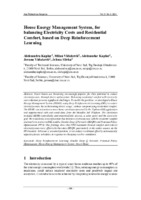House Energy Management System, for balancing Electricity Costs and Residential Comfort, based on Deep Reinforcement Learning
Metadata
Show full item record
URI
Collections
Abstract
Smart homes are becoming increasingly popular for their potential to reduce
electricity costs, through device optimization. Balancing residential comfort with electricity
cost reduction presents significant challenges. To tackle this problem, we developed a House
Energy Management System (HEMS) using Deep Reinforcement Learning (DRL) to reduce
electricity costs, by orchestrating device usage, without compromising residential comfort.
The HEMS was trained on a smart home simulation powered by the Typhoon HIL application
and supplemented with real-world data, from the Mainflux IoT Platform. The simulation
included HEMS-controllable and uncontrollable devices, a solar panel and the electricity
grid. We modelled a reward function that balances electricity cost with the residents' comfort
and used it to train two DRL models: Double Deep Q Network (DDQN) and Proximal Policy
Optimization (PPO). Our findings show that PPO maintains thermal comfort and reduces
electricity costs more effectively than does DDQN, particularly in the colder season. As the
PPO models’ behavior is season-dependent, it can reduce residential effort by automatically
adjusting device schedules in response to changing weather conditions.
- Title
- House Energy Management System, for balancing Electricity Costs and Residential Comfort, based on Deep Reinforcement Learning
- Author
- Kaplar, Aleksandra
- Vidaković, Milan
- Kaplar, Aleksandar
- Vidaković, Jovana
- Slivka, Jelena
- xmlui.dri2xhtml.METS-1.0.item-date-issued
- 2024
- xmlui.dri2xhtml.METS-1.0.item-rights-access
- Open access
- xmlui.dri2xhtml.METS-1.0.item-identifier-issn
- 1785-8860
- xmlui.dri2xhtml.METS-1.0.item-language
- en
- xmlui.dri2xhtml.METS-1.0.item-format-page
- 20 p.
- xmlui.dri2xhtml.METS-1.0.item-subject-oszkar
- deep reinforcement learning, double deep q network, proximal policy optimization, house energy management system, smart home
- xmlui.dri2xhtml.METS-1.0.item-description-version
- Kiadói változat
- xmlui.dri2xhtml.METS-1.0.item-identifiers
- DOI: 10.12700/APH.21.8.2024.8.15
- xmlui.dri2xhtml.METS-1.0.item-other-containerTitle
- Acta Polytechnica Hungarica
- xmlui.dri2xhtml.METS-1.0.item-other-containerPeriodicalYear
- 2024
- xmlui.dri2xhtml.METS-1.0.item-other-containerPeriodicalVolume
- 21. évf.
- xmlui.dri2xhtml.METS-1.0.item-other-containerPeriodicalNumber
- 8. sz.
- xmlui.dri2xhtml.METS-1.0.item-type-type
- Tudományos cikk
- xmlui.dri2xhtml.METS-1.0.item-subject-area
- Műszaki tudományok - anyagtudományok és technológiák
- xmlui.dri2xhtml.METS-1.0.item-publisher-university
- Óbudai Egyetem

